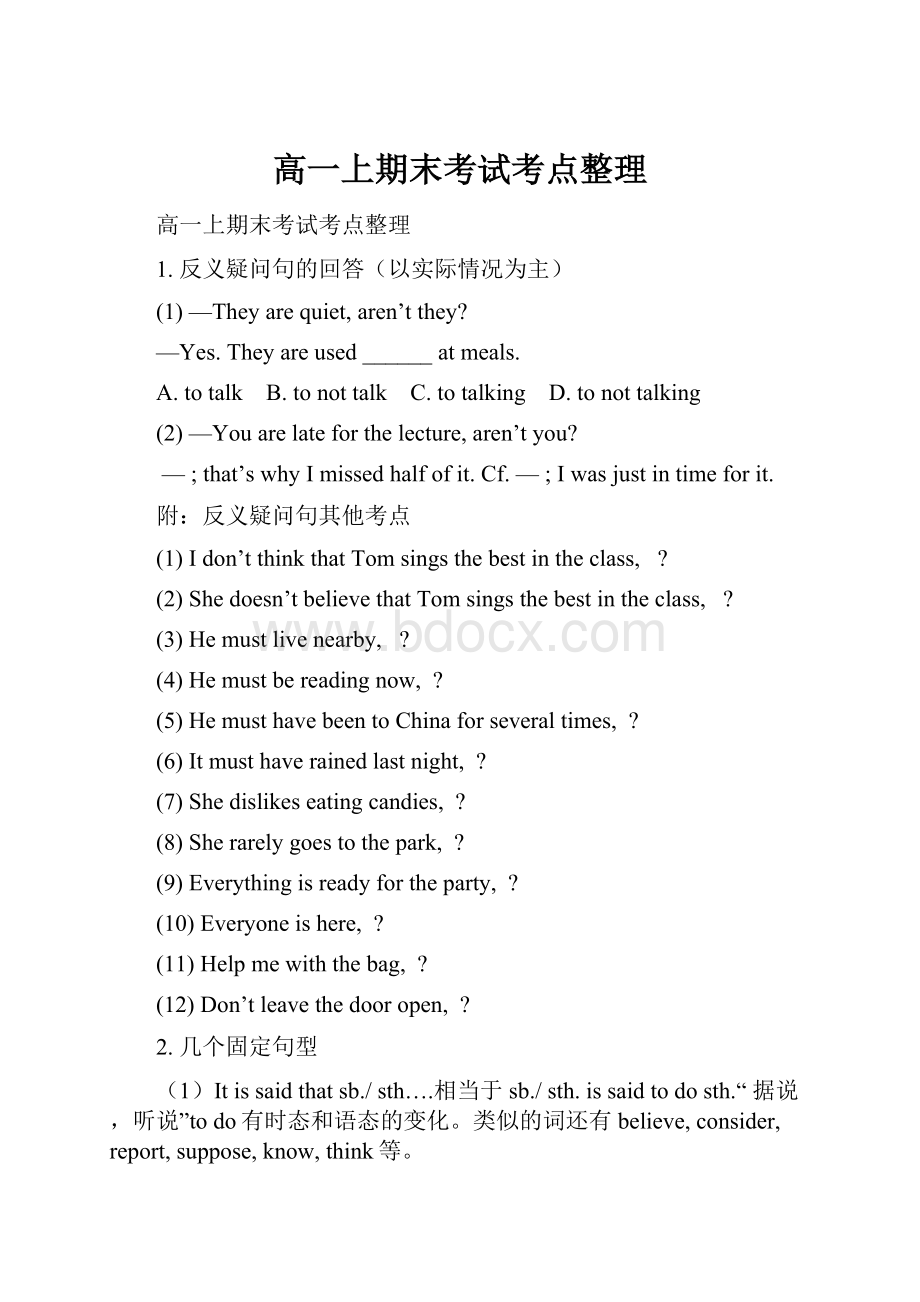高一上期末考试考点整理.docx
《高一上期末考试考点整理.docx》由会员分享,可在线阅读,更多相关《高一上期末考试考点整理.docx(17页珍藏版)》请在冰豆网上搜索。

高一上期末考试考点整理
高一上期末考试考点整理
1.反义疑问句的回答(以实际情况为主)
(1)—They are quiet, aren’t they?
—Yes. They are used ______ at meals.
A. to talkB. to not talkC. to talkingD. to not talking
(2)—Youarelateforthelecture,aren’tyou?
—;that’swhyImissedhalfofit.Cf.—;Iwasjustintimeforit.
附:
反义疑问句其他考点
(1)Idon’tthinkthatTomsingsthebestintheclass,?
(2)Shedoesn’tbelievethatTomsingsthebestintheclass,?
(3)Hemustlivenearby,?
(4)Hemustbereadingnow,?
(5)HemusthavebeentoChinaforseveraltimes,?
(6)Itmusthaverainedlastnight,?
(7)Shedislikeseatingcandies,?
(8)Sherarelygoestothepark,?
(9)Everythingisreadyfortheparty,?
(10)Everyoneishere,?
(11)Helpmewiththebag,?
(12)Don’tleavethedooropen,?
2.几个固定句型
(1)Itissaidthatsb./sth….相当于sb./sth.issaidtodosth.“据说,听说”todo有时态和语态的变化。
类似的词还有believe,consider,report,suppose,know,think等。
(1)Thepresidentisreported(visit)Chinatomorrow.
(2)Thepartyissaid(hold)thedayaftertomorrow.
(2)Heissaid(study)intheUSAatthemoment.
(3)Heissaid(study)abroadlastyear.
(4)Heissaid(consider)takingatriptoEgyptsincelastFriday.
(5)Thenovelissaid(translate)intoseverallanguages.
(2)Itwas+时间段+before…+过去时“过了多久才(怎样)……”
Itwasnotlongbefore…+过去时“不久,就……”
Itwill(not)be+时间段+before…+一般时表将来“要过多久(不久)……才……”
Itwasfivedaysbeforehecameback.
Itwasnotlongbeforehesensedthedangeroftheposition.
Itwillbehalfayearbeforeyougraduatefromtheschool.
Itwillnotbelongbeforeheknowsthetruth.
(3)Itis/hasbeen+时间段+since…+过去时(since从句为短暂性动词,译成某事已发生多久;若为延续性动词,则译成某事多久未发生。
)
他抽烟两年了。
他戒烟两年了。
(4)Itis+时间点+when引导的时间状语从句,译为“当……的时候,是……”
Itwas1992whenhegraduatedfromthisuniversity.
选词填空
(1)Tomygreatjoy,itwasnotlongtheyunderstandeachother.
(2)—Whatwasthepartylike?
—Wonderful.ItisyearsIenjoyedmyselfsomuch.
(3)—DidJackcomebackearlylastnight?
—Yes.Itwasnotyet8o’clockhearrivedhome.
Cf.—Yes.Itwasat8o’clockhearrivedhome.
(5)强调句型的考点概括
(1)It’s not how much we do but how much love weput into what we do____ benefits our workmost.
A. who B. which C. that D. what
(2)It’s not what we do once in a while ______ shapes our lives, but what we do consistently.
A .which B. that C. howD. when
(3)It is I responsible for the accident
A.thatisB.whoisC.whoamD.whomam
(4)Was it on a lonely island ______ he was saved one month after the boat went down?
A. where B. that C. which D. what
(5)-______ that he managed to get the information?
-Oh, a friend of his helped him.
A. Where was it B. What was it C. How was it D. Why was it
(6)Why!
I have nothing to confess. _______ you want me to say?
A. What is it thatB. What it is thatC. How is it thatD. How it is that
(7)Can it be in the restaurant _____we had dinner last Sunday _____you left your wallet?
A.where; where B.where; that C.that; where D.that; that
(8)It _____ we had stayed together for a couple of weeks ____ I found we had a lot in common.
A. was until; when B. was until; that C. wasn’t until; when D. wasn’t until; that
(9)I just wonder ____ that makes him so excited.
A. why it does B. what he does C. how it is D. what it is
(10)Ihavealwaysbeenhonestandstraightforward,anditdoesn’tmatterI’mtalkingto.
A.whoisitB.whoitisC.itiswhoD.itiswhom
(11)It’s the clowns’ clothes, make-up and the way ____they walk ____ make people laugh.
A. where, that B. 不填, that C. in which, where D. that, in which
(12)It was January 1st I paid a visit to my friend Jennifer.
A. that B. until C. before D. when
(13)-Where did you get to know her?
-It was on the farm we worked.
A.that B.there C.which D.where
(6)特殊疑问词+插入语+陈述语序
注意事项:
(1)能够构成插入语的动词有:
think,suppose,believe,imagine,suggest,expect,guess,find,say等。
(2)多用第二人称,时态多为一般现在时。
(1)您认为他发生了什么?
(2)您认为在过去的几年里有多少经典作品被改编为电影(makeintofilms)?
(3)您认为他住在哪里?
(4)您知道他住在哪里吗?
【总结】下列动词后常接宾语从句:
know,hear,tell,hope,ask,remember,understand等。
3.时态部分用法总结
(1)by+时间作状语或bythetime引导的时间状语从句:
用完成时态。
若该结构与表状态动词动词连用:
多用于一般时。
(1)Bythetimehecameback,we(have)ourdinner.
(2)Bythetimehegraduatesfromthiscollege,he(learn)10,000Englishwords.
(3)Bynow,we(learn)3,000Englishwords.
(4)Bythetimehecameback,itwasalready12:
00.
(5)Bythetimeyougettothestation,Iwillbethere.
(2)一般过去时表过去某一时间发生的动作或结果,与现在无关;过去做某事一段时间,但现在不做了,仍用一般过去时。
Hewroteabooklastyear.他去年写了一本书。
(1)Hisgrandpa(play)footballfor20yearswhenhewasyoung.
(2)He(live)inLondonfor4years,buthehasneverregrettedmovingtoChina.
(3)Mymom(teach)Englishfor15years,butnowsheworksinaforeigncompany.
(4)LangpingsaidtohavestartedhercoachingcareerinAmerica(play)volleyballinChinaforalmosttwentyyears.
(3)过去进行时
某些表示心理活动的动词用于过去进行时,表委婉、客气,而不表过去。
IwaswonderingifIcouldaskyouaquestion.
过去点时间或段时间发生的动作或状态。
—What’swrongwithyou?
Youlookupset.—Iwasjustthinkingofafriendinhospital.
ShewaswritingabookaboutYetislastyear,butIdon’tknowwhethershehasfinisheditornot.
(1)Mum,IwaswonderingifyoucouldlendmeafewdollarsuntilIonFriday.
A.getpaidB.gotpaidC.havepaidD.hadbeenpaid
(2)I first met Lisa three years ago. She at a radio shop at the time.
A. has worked B. was working C. had been working D. had worked
(4)某人第几次做某事(用完成时态)。
It/This/Thatisthefirst/secondtimethatsb.hasdonesth.
It/This/Thatwasthefirst/secondtimethatsb.haddonesth.
Thisisthefirsttimeweafilminthecinematogetherasafamily.
A.seeB.hadseenC.sawD.haveseen
(5)在hardly/scarcely…when;nosooner…than句型中,主句要用过去完成时,从句用一般过去时。
注意:
当hardly,nosooner位于句首时构成部分倒装。
Ihadhardlyfinishedmyworkwhenhecametoseeme.
Ihadnosoonergotintotheroomthanitbegantosnow.
Nosooner(reach)homethan(电话铃响了).
Hardly(finish)myworkwhen(他来看我).
4.only+todo表出乎意料的结果
only+doing表自然而然的结果
(1)Hehurriedtothestation,(find)thetrainhadleft.
(2)Hehurriedtothestation,(tell)thetrainhadleft.
(3)Hisfatherlefthome5yearsago,never(return)again.
(4)Hisfatherlefthome5yearsago,never(find)again.
(5)Hewasbusymakingpreparationsforhisreport,only(stop)onceinawhileforacupoftea.
5.祈使句+and(then)/or(else)+简单句,其中祈使句可以与名词短语互换。
Workhardandyouwillpasstheexam.=Abitmoreeffortoryouwon’tpasstheexam.
Ineedcompletequietnesswhenwriting.Alittlenoisefromtheoutsidemyinspirationwillgo.
A.otherwiseB.butC.andD.while
andI'llgettheworkfinished.
A.Haveonemorehour,B.Onemorehour,
C.Givenonemorehour,D.IfIhaveonemorehour,
6.虚拟语气
(1)表示主语“强烈主观愿望”的一类动词及其名词所构成的四种名词性从句(即主、宾、表、同位语从句)中,从句要用虚拟语气,构成为(should)+V原。
Thebossrequiredthatshe(保持安静).
Itisrequiredthatshe(保持安静).
Hisrequirementisthatshe(保持安静).
Hisrequirementthatshe(保持安静)isquitereasonable.
总结:
(2)主句谓语是wish,从句虚拟语气遵循时态倒退原则。
(ifonly,asif用法与之相同)
我要是个明星就好了
要是我没有去过那里就好了
要是我明天能和你一起去就好了
(3)由evenif/though引导的让步状语从句,虚拟语气用法见下表。
说明
从句谓语
主句谓语
与现在情况相反
动词的过去式
(be的过去式用were)
情态动词的过去式(would/could/might)+V原
与过去情况相反
haddone
情态动词的过去式(would/could/might)+havedone
与将来事实相反
情态动词的过去式(would/could/might)+V原
情态动词的过去式(would/could/might)+V原
由without引导的含蓄条件句遵循上表主句谓语的变化规则。
(1)Jackisn’there,butevenifhe(be)here,theproblem
(notsolve).
(2)Jackwon’tcometomorrow,butevenifhe(come)tomorrow,theproblem
(notsolve).
(3)Jackdidn’tcomeyesterday,butevenifhe(come)yesterday,theproblem
(notsolve).
(4)Pleasecometohelpme;withoutyourhelp,I(solve)theproblem.
(5)Thankyouforyourhelp;withoutyourhelp,I(solve)theproblem.
7.全部倒装
(1)作表语的分词(短语)或形容词(短语)位于句首时。
Lyingonthefloorwasawoundedman.
Seatedonthegrassareagroupofyoungcollegestudents.
Presentatthediscussionwereseveralhealthexperts.
(2)表地点的介词短语位于句首用全部倒装。
Outofthejunglecameanoldman.
Infrontofthehousestandsatalltree.
(3)用于therebe/live/stand/lie/appear/seem/remain等句型中。
There__________(seem)tobemanylisteners.Cf.There__________(seem)tobeonlyonelistener.
(4)用于“here/there/now/then/out/in/up/down/away+不及物动词+主语”的句型中,以表强调。
Outrushedtheboy.
注意:
若主语为代词时,只把该副词提前,主谓语序不变。
Outherushed.
(5)so,nor,neither+陈述表示“重复”so,nor,neither+倒装表示“前者适用于后者”
谓语动词应于前句谓语时态保持一致。
—DavidhasmadegreatprogressinEnglishrecently.
—Sohehas.Andsohaveyou.(译)
Ifyoudon’tgotothecinema.NorI.
若是下面情况,须用句型soitiswith…/It’sthesamewith…
—Iseldomgotothecinema,butIenjoyfilmsonTV.
—SoitiswithTom./It’sthesamewithTom.
—Iloveplayingfootball,andI’mfondofmusic,too.
—SoitiswithTom./It’sthesamewithTom.
(1)Hearingthedogbarkingfiercely,away.
A.fleeingthethiefB.wasfleeingthethief
C.thethiefwasfleeingD.fledthethief
(2)AtthemeetingplaceoftheYangtzeRiverandJialingRiver,oneofthelargestcitiesinChina.
A.liesChongqingB.ChongqingliesC.doeslieChongqingD.doesChongqinglie
(3)Distinguishedguestsandfriends,welcometoourschool.theceremonyofthe50thAnniversarythismorningareouralumni(校友)fromhomeandabroad.
A.AttendB.ToattendC.AttendingD.Havingattended
(4)Onlywhenhereachedthetea-house(herealize)it